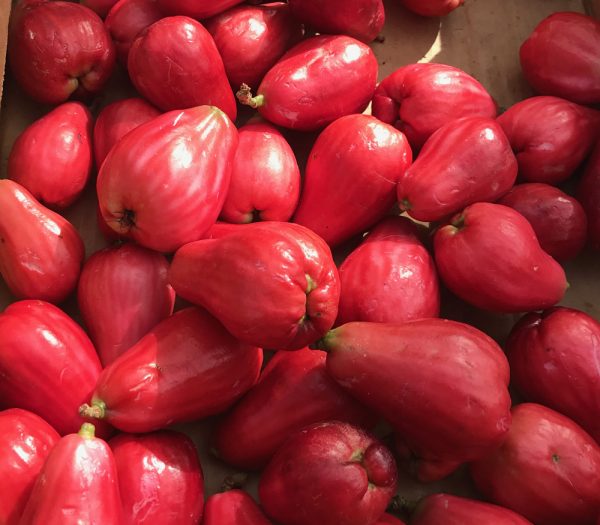Malay Apple is majorly in three colours – red, green and cream with many varieties of each type. In Nigeria, the commonest type is the red colour, the green is scanty, while the cream colour may not be readily available now. It has a sweet-sour taste.
It also comes in three different shapes – oblong, obovoid and bell. The shelf life is 3 – 4 days. The apples stay between 17 – 19 days on the trees during harvest.
Read more about Food
Malay apple seed
It is a single oblate or nearly round seed. It is light brown outside, green inside. Somewhat meaty in texture. It has shown antibiotic activity and has some effects on blood pressure and respiration. it is medicinal in the application. It is used to allay the fever.
Harvest
Each Malay apple must be carefully plucked from the tree and maintained in cool storage shortly thereafter. To remove from the tree, simply twist the apple’s stem.
Storage
Malay apple does not store well in the refrigerator, as they are susceptible to cold. Keep the apples on the counter, where they will keep for three to four days. In a nutshell, it does not store well under a freezing form of refrigeration. The shelf life is prolonged under a chilling form of refrigeration at a specific temperature.
Medicinal Uses.
Malayans apply a powder of the dried leaves on a cracked tongue. Preparation of the root is a remedy for itching. The root bark is useful against dysentery. the juice of crushed leaves is applied as a skin lotion and added to a bath.
In Brazil, various parts of the plants are used as remedies for constipation, cough, diabetes, headache and other ailments.
Sign up to the Connect Nigeria daily newsletter
Why Malay apple Farming?
- To boost local fruit production.
- For the consumption of fresh apples for healthy living without the use of any chemical preservative.
- The apples are highly medicinal. Various parts are used as remedies for overcoming different health challenges.
- A Malay apple tree produces much more apples than the temperate apple tree.
- To reduce help Nigeria’s import bill on apples from South Africa, Europe and Asia.
- Amazing wealth creation opportunities for the people in the areas of production, processing into valuable products for local consumption and export, information and internet marketing.
- To create job opportunities for graduates of agriculture and other relevant disciples.
Business opportunities around Malay apple Farming.
- Sale of apples. As at 2006, it was sold for #5 each. Today, the small size is #50, the big size is #100, while the jumbo size is #150 each.
- Sale of Malay apple seeds and Germinated seeds. As at 2010, a seed was sold for #50 each, but now, each seed is #100 each. The germinated seeds are between 3 – 5 weeks after planting at the pre-nursery stage. The cost of each germinated seed is #150.
Malay apple seedlings production.
The seed is #100 each. It involves raising the seeds into seedlings. You will start making money from the 10th week after planting.
Seedlings production can be done at home. At the backyard and gardens. A minimum of 50% returns on investment is guaranteed.
There is a ready market for the sale of the seedlings especially from March to December each year.
Malay apple farm Plantation.
The recommended spacing is 5m by 5m. The number of seedlings for a plot of land is 26 seedlings, 160 for an acre ( 6 plots) and 400 seedlings on a hectare of land (15 plots).
Featured Image Source: Trade Winds Fruit
Got a suggestion? Contact us: editor at connectnigeria dot com


